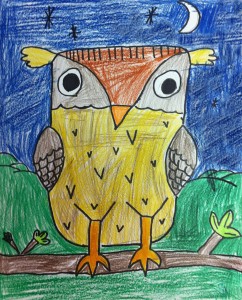Good Enough?
May 19, 2016 - 6 minutes readI recently taught an art lesson that I thought was going quite well. Students were working on the art elements of line and perspective. We had been learning about owls and so we were zooming in on one aspect of the owl’s body that helps it adapt to survive. Students were busy and engaged with their drawings. As time passed and students came to the point where they were finishing up I had a student come up to me and ask if his drawing was “good enough?” Shivers ran down my spine at the phrase and I took a deep breath and gave what I thought was a brilliant response as I redirected the student to reflect himself on whether or not he was happy with his drawing, whether he felt it was good enough, and whether or not he had put forth his best effort. Just as I was about to pat myself on the back, he looked at me and said, “yeah, but is it good enough?” Sadly, I had two more students come and ask me a similar question before the art class concluded. So, I brought the class to the carpet and we had a discussion about “good enough,” and I reiterated that we need to be reflective and that I was not the one who decided what was good enough.
I felt a bit out of sorts about this all day and I couldn’t shake the notion that I hadn’t quite got my message across to my grade one students, and felt sad that they were looking to me to validate their efforts as “good enough.”owl.jpg
After school that day I had an opportunity to attend a presentation by George Couros, author of the book, An Innovator’s Mindset and the blog, Principal of Change. George spoke to us about developing innovative students who are excited to be in our classrooms. I immediately thought of my students asking if their work was good enough.
 Couros’ work was inspired by Carol Dweck’s book Mindset: The New Psychology of Success where she demonstrates that having a growth mindset (believing that one’s abilities, intelligences, and talents can be developed) leads to greater success than those who have a fixed mindset (believing that one’s abilities, intelligence, and talents are fixed traits). Couros argues that we have a responsibility to not only make sure we develop a growth mindset in our students, but that we develop an innovator’s mindset. Innovation is a way of thinking that creates something new and better. So no matter what profession or life path our students may choose, we want them to have the ability to innovate.
Couros’ work was inspired by Carol Dweck’s book Mindset: The New Psychology of Success where she demonstrates that having a growth mindset (believing that one’s abilities, intelligences, and talents can be developed) leads to greater success than those who have a fixed mindset (believing that one’s abilities, intelligence, and talents are fixed traits). Couros argues that we have a responsibility to not only make sure we develop a growth mindset in our students, but that we develop an innovator’s mindset. Innovation is a way of thinking that creates something new and better. So no matter what profession or life path our students may choose, we want them to have the ability to innovate.
In order to develop our future leaders George suggests that there are eight characteristics that teachers and learners need if we are going to be innovative. When Couros was speaking with us, he presented these characteristics in partnership with each other (which I loved) and so I will do the same.
Empathetic/Problem Finders: When we are empathetic to the plights of others we are motivated to identify problems that need to be solved.
Risk-takers/Networked: It becomes much easier for us to take risks if we are surrounded by others who we can share ideas with and build ideas from.
Observant/Creators: We live in a world where we can view content from around the world at any time of day. Messages and ideas spread quickly and we are able to observe more than ever, but it is also crucial that we are creating content and contributing to the spread of new ideas.
Resilient/Reflective: If we hope to develop innovative students we are going also need to develop resilient students who are willing to get back up after a fall, because they will fall, but more than just resiliency we need our students to be reflective in order for them to learn from their set backs.
So, how does this connect to my art lesson? I’m not sure, but I know that good enough is not good enough for my students or me. Compliance does not foster innovation and I want them to be innovators. Whether they are innovative in the kitchen creating new recipes, designing new pharmaceuticals that treat cancer, increasing efficiency on a factory floor, or writing the next great novel none of these things will come if we stop at good enough.
To read more from George Couros check out his web page: http://georgecouros.ca/blog/
To read more from Carol Dweck check out her web page: http://mindsetonline.com/